Weather is something we all experience daily, and yet, it has a powerful way of reflecting our emotions, moods, and even life’s unpredictability. Just as the skies shift from sunshine to storms, so too do our thoughts and feelings. Using metaphors for weather can help us communicate warmth, tenderness, and depth in ways that plain words sometimes cannot. Metaphors for Weather.
In this article, I’ll share 25 thoughtful weather metaphors that can add color to your language. These aren’t just pretty phrases—they can help you connect with others, express care, and capture the beauty of everyday moments. I’ve personally found that comparing emotions to weather helps me both write and speak in a way that resonates more deeply with others.
1. Sunshine
Meaning: A metaphor for joy, warmth, and positivity.
Sentence: Her smile was pure sunshine, lighting up the darkest day.
Best Use: Perfect for describing someone who brings light into your life.
Other Ways to Say: Radiance, brightness, glow.
Read More: Metaphors for Wind
2. Storm Clouds
Meaning: Symbol of troubles, worries, or emotional heaviness.
Sentence: Storm clouds gathered in his mind as he faced uncertainty.
Best Use: Useful when speaking about challenges or inner struggles.
Other Ways to Say: Shadows, burdens, dark thoughts.
3. Gentle Breeze
Meaning: Represents calmness, relief, and soothing energy.
Sentence: Her words were like a gentle breeze, easing his worries.
Best Use: Great for describing peace or small comforts.
Other Ways to Say: Whisper of air, soft wind, sigh.
4. Heavy Rain
Meaning: A metaphor for sorrow, grief, or overwhelming feelings.
Sentence: Tears fell like heavy rain after the goodbye.
Best Use: When talking about loss, sadness, or deep emotions.
Other Ways to Say: Downpour, flood, cascade.
5. Rainbow
Meaning: Symbol of hope and beauty after struggles.
Sentence: After the storm, their love was a rainbow of possibilities.
Best Use: Expressing resilience and optimism.
Other Ways to Say: Spectrum, promise, light after darkness.
6. Thunder
Meaning: Represents sudden anger, power, or intensity.
Sentence: His words struck like thunder in the silence.
Best Use: To describe strong, startling emotions.
Other Ways to Say: Roar, boom, clash.
7. Lightning
Meaning: A metaphor for brilliance, inspiration, or sudden change.
Sentence: The idea struck her like lightning in the night.
Best Use: Perfect for describing creativity or revelation.
Other Ways to Say: Spark, flash, strike.
8. Mist
Meaning: Symbol of uncertainty, confusion, or mystery.
Sentence: His past was hidden in a mist she couldn’t see through.
Best Use: When talking about unclear situations or emotions.
Other Ways to Say: Fog, haze, blur.
9. Snowfall
Meaning: Represents purity, stillness, and quiet beauty.
Sentence: Her forgiveness fell like soft snowfall, covering mistakes gently.
Best Use: To express peace, renewal, or innocence.
Other Ways to Say: Frost, flakes, white blanket.
10. Hurricane
Meaning: A metaphor for chaos, destruction, or emotional turmoil.
Sentence: The breakup left his heart in a hurricane.
Best Use: When describing overwhelming life events.
Other Ways to Say: Cyclone, storm, whirlwind.
11. Clear Skies
Meaning: Symbol of peace, clarity, and calmness.
Sentence: After weeks of stress, her mind finally found clear skies.
Best Use: To show resolution or relief.
Other Ways to Say: Serenity, openness, blue horizon.
12. Drizzle
Meaning: Represents small worries or gentle emotions.
Sentence: Their conversation was a drizzle of laughter and care.
Best Use: For describing lighthearted or tender moments.
Other Ways to Say: Sprinkle, light rain, soft shower.
13. Heatwave
Meaning: A metaphor for passion, intensity, or discomfort.
Sentence: The city felt like a heatwave of unspoken emotions.
Best Use: When expressing passion, stress, or intensity.
Other Ways to Say: Blaze, scorch, fiery spell.
14. Frost
Meaning: Symbol of coldness, distance, or emotional detachment.
Sentence: His words carried a frost that silenced the room.
Best Use: When describing emotional coldness.
Other Ways to Say: Chill, ice, frozen silence.
15. Drought
Meaning: Represents lack, emptiness, or longing.
Sentence: Her heart felt like a drought without his presence.
Best Use: For times of longing or emotional emptiness.
Other Ways to Say: Dry spell, scarcity, void.
16. Wildfire
Meaning: A metaphor for unstoppable passion or destruction.
Sentence: Their love spread like wildfire, fierce and consuming.
Best Use: Great for intensity in love or conflict.
Other Ways to Say: Blaze, inferno, raging fire.
17. Cloudburst
Meaning: Sudden outpouring of emotions or events.
Sentence: Her laughter was a cloudburst of happiness.
Best Use: To describe sudden emotional release.
Other Ways to Say: Torrent, gush, downpour.
18. Hailstorm
Meaning: Represents aggression, harshness, or relentless troubles.
Sentence: He faced a hailstorm of criticism after his decision.
Best Use: When facing hardships or challenges.
Other Ways to Say: Onslaught, barrage, storm of words.
19. Twilight
Meaning: Symbol of endings, transitions, or quiet beauty.
Sentence: Their love story faded into twilight, soft and bittersweet.
Best Use: Expressing closure or reflection.
Other Ways to Say: Dusk, evening light, sunset glow.
20. Sunrise
Meaning: Represents beginnings, hope, and fresh starts.
Sentence: Her courage was a sunrise after a long night of fear.
Best Use: When talking about new opportunities.
Other Ways to Say: Dawn, first light, awakening.
21. Windstorm
Meaning: Symbol of sudden disruption or rapid change.
Sentence: Life hit them like a windstorm, scattering their plans.
Best Use: When explaining unexpected life challenges.
Other Ways to Say: Gusts, squall, turbulence.
22. Dewdrops
Meaning: A metaphor for tenderness, purity, and fresh beauty.
Sentence: Her eyes sparkled like dewdrops at sunrise.
Best Use: Perfect for describing freshness or delicacy.
Other Ways to Say: Morning pearls, droplets, shimmer.
23. Eclipse
Meaning: Symbol of temporary darkness or hidden truths.
Sentence: The eclipse of trust left their friendship in shadows.
Best Use: To show moments of concealment or difficulty.
Other Ways to Say: Obscurity, shadowing, covering.
24. Blizzard
Meaning: Represents overwhelming confusion, chaos, or coldness.
Sentence: He got lost in the blizzard of his own thoughts.
Best Use: When describing mental or emotional overload.
Other Ways to Say: Snowstorm, whiteout, icy storm.
25. Breeze of Change
Meaning: A metaphor for growth, transformation, and new possibilities.
Sentence: A breeze of change carried her toward a brighter future.
Best Use: When describing personal or collective transformation.
Other Ways to Say: Shift, movement, wind of renewal.
FAQs About Metaphors for Weather
1. Why do people use weather metaphors?
Because weather reflects our emotions and experiences—sometimes calm, sometimes turbulent—it helps us express feelings more vividly.
2. Can weather metaphors be used in daily conversations?
Absolutely. Simple phrases like “clear skies ahead” or “stormy mood” make everyday language more expressive.
3. Are these metaphors common in literature?
Yes, poets, novelists, and songwriters often use them to symbolize human emotions.
4. Can weather metaphors be used in professional settings?
Yes, with care. For instance, saying “We’re weathering the storm” can be motivating in a business context.
5. How do I choose the right metaphor?
Pick the one that aligns with the tone you want—whether it’s hopeful like a sunrise, or heavy like a storm cloud.
Conclusion
Weather is more than just a backdrop it’s a mirror to our feelings, stories, and life’s journey. By using metaphors for weather, we can speak with greater empathy, depth, and creativity. Whether you’re writing a heartfelt letter, journaling your thoughts, or simply connecting with a friend, these metaphors offer a gentle, powerful way to share what words alone sometimes cannot.
So next time you’re searching for the right expression, remember: sometimes, your heart is just like the sky full of sunshine, storms, or the promise of rainbows.

Daniel Matthew is a passionate visionary who believes in creativity, purpose, and innovation. With a focus on growth and authenticity, he turns every idea into meaningful impact.



